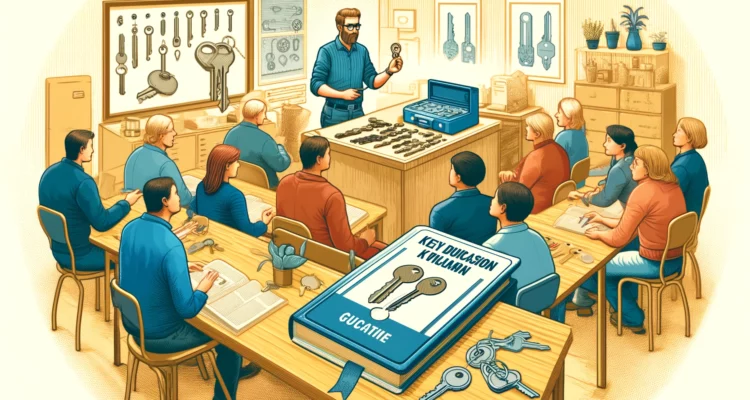The Evolution Of Locksmith Services: Past, Present, And Future
Embark on a captivating journey through time with “The Evolution of Locksmith Services: Past, Present, and Future,” where the art of security transforms to meet the heart of home protection. Imagine tracing back to a time when a simple lock and key were the pinnacles of security, evolving into today’s world where comprehensive home inspections ensure your sanctuary remains impenetrable. This exploration takes you through the intricacies of ensuring your home and loved ones are safe, marrying traditional methods with cutting-edge technology to offer complete peace of mind. Delve into how the locksmith services have expanded far beyond their humble beginnings, embracing innovation and humanizing security to protect what’s most precious to you in an ever-changing landscape. It’s more than just about locks; it’s about fostering a secure environment where you can flourish without fear, surrounded by the comforts of your personalized haven.

This image is property of actionlocksmithinc.com.
Historical Beginnings of Locksmithing
Origins and early inventions
Locksmithing traces its origins back to ancient times when the first locks were created to safeguard possessions. The earliest documented lock was found in the ruins of Nineveh, the capital of ancient Assyria, and similar devices were used in Egypt, Greece, and Rome. These early inventions were primarily made of wood and utilized a simple pin tumbler principle, which is still the foundation of modern locks.
Influence of locksmithing in ancient civilizations
In ancient civilizations, locksmithing was not just about security; it also symbolized status and power. The more elaborate and complex the lock was, the higher the status of its owner. This led to locksmiths being held in high esteem, as they possessed the skills to both protect and signify wealth and influence through their crafts.
Evolution of mechanical locks
As civilizations advanced, so did the complexity and variety of locks. The invention of metal locks during the Iron Age marked a significant evolutionary step in locksmithing, leading to the development of more secure and durable locking mechanisms. This evolution was a response to the increasing need for security as societies grew and wealth accumulated.
The Middle Ages to the Industrial Revolution
Craftsmanship during the Middle Ages
During the Middle Ages, locksmithing was considered a highly skilled craft. Locksmiths were artisans who created beautifully decorated locks and keys, often incorporating religious and symbolic motifs into their designs. These were not merely functional but also artistic expressions of the era.
Locksmithing guilds and their roles
The formation of locksmithing guilds in the medieval period was pivotal in the development of the trade. These guilds regulated the profession, setting standards for quality and integrity, and provided apprenticeships to train the next generation. They played a crucial role in maintaining the locksmith’s reputation and skills.
Impact of the Industrial Revolution on locksmithing
The Industrial Revolution brought about significant changes in locksmithing. The mass production of locks and keys became possible, which, while making them more accessible to the general populace, also posed challenges to traditional locksmiths. However, it simultaneously pushed the profession to innovate and adapt to the new industrialized world.

This image is property of okeylocksmith.com.
The Modern Locksmith
Transition to the modern era
The transition to the modern era of locksmithing was marked by the integration of precision engineering and standardization of locks and keys. This period saw the emergence of complex locking mechanisms and the introduction of the concept of security systems as we understand them today.
Advent of lock-picking and security concerns
With the sophistication of locks, lock-picking also became a more nuanced skill. It raised security concerns and led to a continuous cycle of innovation between lock makers and those attempting to bypass these security measures. This era also saw locksmiths playing a crucial role in developing countermeasures to lock-picking techniques.
Inclusion of advanced materials and techniques
Modern locksmithing has embraced advanced materials like steel alloys for enhanced strength and durability, as well as techniques such as electronic locking mechanisms. These advancements have significantly improved security levels and widened the scope of locksmithing services.
Locksmith Services in the 20th Century
Rise of locksmith businesses
The 20th century witnessed the rise of professional locksmith businesses. These enterprises offered a wide range of services, from installing and repairing locks to advising on security solutions for both residential and commercial properties.
Specialization in automotive locksmithing
With the advent of automobiles, a new specialization within locksmithing emerged – automotive locksmithing. This niche focuses on car locks and keys, including transponder keys and electronic access systems, responding to the unique security needs of vehicles.
The influence of electronic security systems
The late 20th century saw the introduction of electronic security systems, marking another significant evolution in locksmithing. These systems included keycard access, biometric authentication, and digital surveillance, redefining the concept of security and expanding the locksmith’s role in its implementation.

This image is property of actionlocksmithinc.com.
The Digital Age and Locksmithing
Introduction of electronic and smart locks
The digital age introduced electronic and smart locks, integrating locksmithing with information technology. These locks offer remote access, user tracking, and customization, representing a technological leap in how we secure our spaces.
Impact of the internet and digital communication
Digital communication and the internet have transformed how locksmith services are delivered. Online access to locksmith services has increased availability and convenience for customers, allowing for rapid response times in emergency situations.
The rise of cybersecurity concerns in locksmithing
With the increasing reliance on digital locking mechanisms, cybersecurity has become a concern in the realm of locksmithing. Protecting against digital hacking and unauthorized access is now part of a locksmith’s repertoire, blending physical security with digital security measures.
Present-Day Locksmith Services
Comprehensive home security inspections
Today, homeowners seek more than just installation services; they look for comprehensive home security inspections. These inspections involve evaluating all potential vulnerabilities and recommending measures to enhance the safety of residents and property. It’s about creating a sanctuary, a secure environment where families can feel truly safe.
Innovations in smart home security
Innovation continues to drive locksmith services, with smart home security being at the forefront. These systems offer advanced protection, integrating seamlessly with home automation to provide both security and convenience. Smart locks are a key component, offering features like remote locking and unlocking, access logs, and integration with home security systems.
Humanizing security: Beyond technical solutions
The focus of modern locksmithing goes beyond just technical solutions; it’s about humanizing security. Understanding homeowners’ specific needs and concerns is paramount in delivering services that not only secure but also blend with the lifestyle and personal preferences of the customer.

This image is property of imageio.forbes.com.
Specialized Locksmithing Services
Automotive locksmithing advancements
Advancements in automotive locksmithing have kept pace with modern vehicle technologies, addressing the unique challenges of car security. This includes the expertise to handle transponder key programming, key fob replacement, and unlocking sophisticated electronic car locks.
Commercial vs. Residential locksmithing services
The divide between commercial and residential locksmithing services has become more pronounced, with each area requiring specific skills and knowledge. Commercial locksmithing often involves complex security systems, access controls, and master key systems, while residential services focus on enhancing personal home security.
Emergency locksmith services and 24/7 availability
The need for emergency locksmith services has led to the availability of 24/7 assistance. Whether it’s a lockout situation or a broken key emergency, modern locksmiths offer rapid response services to resolve issues at any hour, providing peace of mind to those in distress.
The Future of Locksmithing
Technological advancements on the horizon
As technology continues to evolve, so does the field of locksmithing. Future advancements may include further integration with smart home technologies, improved biometric systems, and even AI-driven security solutions. The potential for innovation is vast, promising even more effective and personalized security options.
The growing importance of cybersecurity in physical locks
As locks become smarter and more connected, the importance of cybersecurity in locksmithing cannot be overstated. Protecting against digital threats will be as critical as safeguarding against physical tampering, merging the realms of digital and physical security.
Predictions for the evolution of smart homes and IoT devices
The evolution of smart homes and IoT devices is likely to significantly impact locksmithing. As homes become smarter, so will the locks, with increasingly sophisticated systems designed to integrate seamlessly with home automation, offering unprecedented levels of control and security.

This image is property of www.lockout247.co.uk.
Educational Path and Certification
Required skills and knowledge for modern locksmiths
The modern locksmith is required to have a broad range of skills and knowledge, not only in traditional locksmithing techniques but also in electronics, cybersecurity, and customer service. This diverse skill set is essential for navigating the complexities of today’s security challenges.
Certification processes and continuing education
Certification has become an important aspect of the locksmithing profession, offering validation of a locksmith’s skills and knowledge. Continued education is also crucial, as it allows locksmiths to stay abreast of the latest technologies, tools, and security strategies.
The role of apprenticeships in locksmithing careers
Apprenticeships continue to play a vital role in locksmithing careers, offering hands-on experience and mentorship from seasoned professionals. This traditional pathway helps ensure the transfer of knowledge and skills to the next generation, maintaining the high standards of the profession.
The Societal Impact of Locksmithing
Evolving role of locksmiths in community safety
Locksmiths play a critical and evolving role in community safety. By safeguarding homes, businesses, and vehicles, they contribute significantly to the overall security of society. Their expertise enables them to respond to changing security needs and emerging threats, making them invaluable in the pursuit of public safety.
Locksmith services during crises and natural disasters
In times of crises and natural disasters, locksmith services become even more crucial. Whether it’s securing damaged properties or providing access to emergency services, locksmiths offer essential services that aid in recovery and restoration efforts, demonstrating their importance in challenging times.
Future outlook: Locksmiths as integral players in security innovation
Looking to the future, locksmiths are poised to remain integral players in security innovation. Their unique blend of technical skills, creativity, and understanding of security needs positions them to lead the way in developing new solutions that protect against evolving threats. As society’s needs change, locksmiths will continue to adapt, ensuring they remain at the forefront of security technology and practices.





